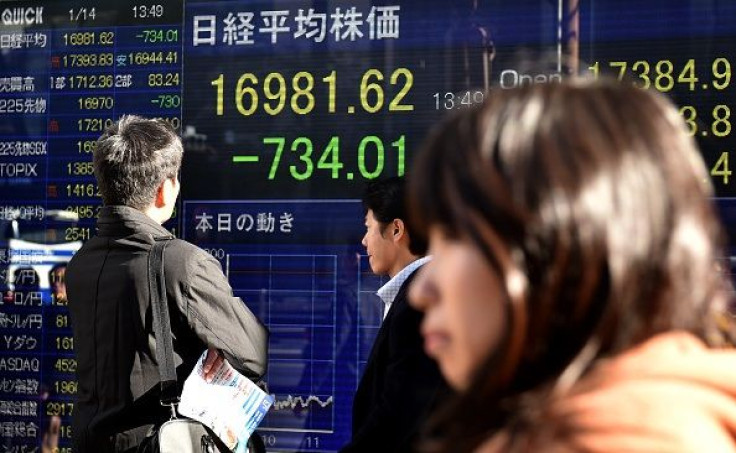Asia Shares Win Reprieve After Oil Rebound

Asian stocks won a temporary reprieve on Friday after oil prices snapped their eight-day rout, helping to lift battered energy shares even as investors remained on edge as they looked for signs of stability in China's economy and its volatile markets.
MSCI's broadest index of Asia-Pacific shares outside Japan, which hit a four-year low on Thursday, rose 0.5 percent while Japan's Nikkei jumped 1.8 percent.
Oil prices rebounded on Thursday, with international benchmark Brent futures rising 2.4 percent to $31.03 a barrel, recovering from its 12-year low of $29.73 hit earlier in the day.
Although that was largely driven by short-covering after a 20 percent fall since the start of year, it helped to lift U.S. shares from three-month lows.
The S&P 500 gained 1.7 percent on Thursday, led by a 4.5 percent rise in the energy sector.
The markets was also helped by comments from St. Louis Federal Reserve President James Bullard that the continued rout on global oil markets has caused a "worrisome" drop in U.S. inflation expectations that may make further rate hikes hard to justify.
U.S. retail sales data due later on Friday will be on investors' radar as they try to gauge the likelihood of the Fed raising rates in March.
In Asia, fears that Chinese authorities may not be able to manage a decelerating economy are also ebbing as efforts by China's central bank to stabilize the yuan has paid off for now - albeit via heavy intervention.
Worries that a depreciating yuan could spark competitive currency devaluation across the region had hit global shares earlier this month.
"There are some hopes that a series of Chinese economic data due early next week will give investors relief." said Hirokazu Kabeya, chief global strategist at Daiwa Securities.
China will publish a host of data on Monday and Tuesday, including GDP for Oct-Dec.
"Traditionally Chinese shares perform relatively well around the time of lunar new year and Shanghai shares also appear to be supported around the 3,000 mark even as they briefly fell below that level yesterday," he added.
The Shanghai composite index ended 2.0 percent higher on Thursday, reversing earlier fall to a 4 1/2-month low.
In the currency market, the yen slipped back near this week's low as it gave up earlier gains made on safe-haven buying.
The dollar rose to 118.28 yen, up 0.2 percent in early Asian trade, extending its rebound from a 4 1/2-month low of 116.70 yen hit on Monday.
The euro moved little within its well-worn range, fetching $1.0855.
The European Central Bank said it saw scope for further cuts in its deposit rate in minutes of its December meeting, but many ECB policymakers appeared sceptical about the need for further action in the near term.
Commodity-linked currencies also recovered from lows, with the Australian dollar gaining 0.2 percent to $0.6995, keeping some distance from Thursday's four-month low of $0.6910.
Still, investors remain cautious on the commodity-linked assets as oil prices are expected to stay under pressure due to fear of oversupply.
Saudi Arabian shares, one of the worst performing market along with China so far this year, hit five-year lows on Thursday.
Low oil prices not only hurt many oil-producing countries but also prompt their sovereign wealth funds to sell assets to finance budget gaps, putting pressure on many assets.
(Editing by Shri Navaratnam)
© Copyright Thomson Reuters 2024. All rights reserved.











